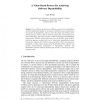Free Online Productivity Tools
i2Speak
i2Symbol
i2OCR
iTex2Img
iWeb2Print
iWeb2Shot
i2Type
iPdf2Split
iPdf2Merge
i2Bopomofo
i2Arabic
i2Style
i2Image
i2PDF
iLatex2Rtf
Sci2ools
120
click to vote
ISPW
2005
IEEE
2005
IEEE
A Value-Based Process for Achieving Software Dependability
Since different systems have different success-critical stakeholders, and these stakeholders depend on the system in different ways, using traditional one-size-fits-all dependability metrics to drive the system and software development process is likely to lead to delivered systems that are unsatisfactory to some stakeholders. This paper proposes a Value-Based Software Dependability Achievement (VBSDA) process generated from the WinWin Spiral Model’s risk-driven approach coupled with a set of value-based dependability analysis frameworks, methods, and models for reasoning about software and system dependability. It helps project success-critical stakeholders define, negotiate and develop mission-specific combinations of dependability attributes. The NASA/USC Inspector SCRover (ISCR) project is used as a case study to elaborate the process.
Dependability | ISPW 2005 | One-size-fits-all Dependability Metrics | Software Engineering | Value-Based Software Dependability |
Related Content
| Added | 25 Jun 2010 |
| Updated | 25 Jun 2010 |
| Type | Conference |
| Year | 2005 |
| Where | ISPW |
| Authors | LiGuo Huang |
Comments (0)

